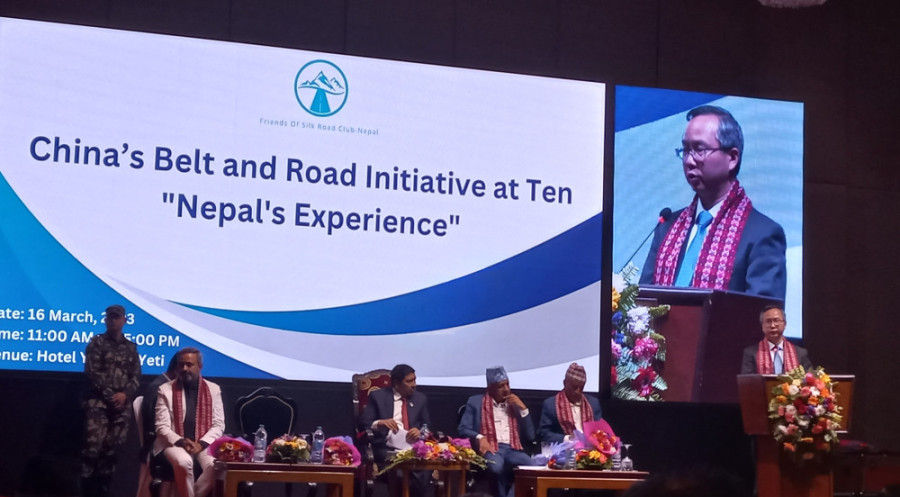Money
BRI platform for economic cooperation, not a geopolitical tool: Chinese envoy
Nepal has not been able to take advantage of China’s Belt and Road Initiative six years after signing it, officials say.
Post Report
China’s Belt and Road Initiative (BRI) is an ambitious effort to deepen regional cooperation and improve connectivity on a trans-continental scale, multiple speakers reiterated at a conference here on Thursday.
They urged people not to doubt it by conjuring up false narratives such as a debt trap laid out by China.
BRI is at the centre of Chinese foreign policy under President Xi Jinping’s administration.
BRI includes investment programmes that seek to develop infrastructure and promote economic integration within partner countries.
The BRI consists primarily of the Silk Road Economic Belt, linking China to Central and South Asia and onwards to Europe, and the New Maritime Silk Road, linking China to the nations of Southeast Asia, the Gulf Countries, North Africa, and on to Europe.
Six other economic corridors have been identified to link other countries to the BRI.
Nepal signed up to the BRI Framework Agreement in May 2017 but not a single project has taken off due to several constraints including funding.
The Thursday conference in Kathmandu was to mark 10 years of the BRI.
Leela Mani Paudyal, former ambassador of Nepal to China, said that the BRI Framework Agreement, which Nepal has signed with China does not deserve criticism.
“There are no such provisions Nepal has to worry about,” said Paudyal, speaking at the conference organised by Friends of Silk Road Club-Nepal. “Most of the western scholars have been building a false narrative saying the BRI is a debt-trap.”
“The source of the loan cannot be a debt-trap,” Paudyal added.
A Chinese team recently visited Nepal to carry out the survey for a cross-border railway project. This could be one of the key components of the BRI, which is also named the Trans-Himalayan Multi-Dimensional Connectivity Network, according to officials.
Chinese Ambassador to Nepal Chen Song said that China's investment in BRI totalled $161.3 billion, with an average annual growth rate of 5.4 percent.
“The value of projects in countries implementing the BRI is about $1.1 trillion.”
Chen claimed that the BRI is a platform for economic cooperation and is not a geopolitical tool. “The so-called China’s debt trap is a false narrative,” Chen added.
China has become the top country in terms of making foreign direct investment (FDI) commitments to Nepal, according to Chen.
China’s FDI commitment accounts for 51.7 percent of the total FDI in Nepal.
Deputy Prime Minister Narayan Kaji Shrestha said that Nepal is ready to fully implement the BRI.
“We are hopeful that the cooperation with China and implementation of the BRI will be a new milestone for the prosperity and development of Nepal,” said Shrestha. “We are ready to discuss the modalities of cooperation before reaching a conclusion.”
“We will not be affected by any kind of misinformation—such as debt-trap.”
Former Foreign Minister Pradeep Gyawali said that the BRI envisions inclusivity in globalisation.
“Nepal must take advantage by establishing a proper connectivity with its neighbours,” said Gyawali. “But, we have not been able to take advantage of the BRI due to our inability to prioritise projects and the geopolitical issues.”
“While we have not yet discussed the financial modality in the proposed BRI projects, a narrative is being established that the BRI equals debt-trap, which is wrong,” Gyawali added.
Khadga KC, a professor at the Department of International Relations and Diplomacy at the Tribhuvan University, said that projects under the BRI are difficult to be implemented.
“None of the governments in recent years have shown interest in the BRI,” said KC. “Regarding foreign grants and loans, Nepal should choose the sources as per its needs and capacity, irrespective of the country.”
However, Bhoj Raj Paudel, policy reform advisor at South Asia Watch on Trade, Economics and Environment, said most of the Nepali projects under the BRI are merely a wish list floated by the politicians. “They will take the country nowhere.”




 10.12°C Kathmandu
10.12°C Kathmandu













